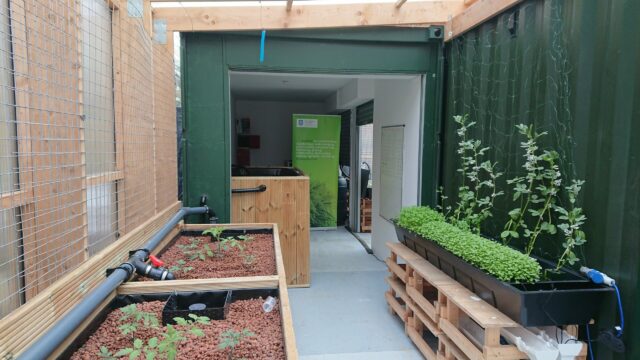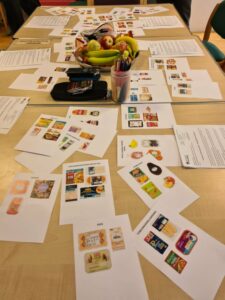For World Food Day on 16 October 2022, Tracey Duncombe highlights how research funded through the Transforming UK Food Systems Programme is striving to meet the UN Sustainable Development Goals’ guiding principle Leave NO ONE behind.

A growing number of people in the UK cannot access or afford to eat a diet that meets their nutritional needs. Over 7 million UK adults reported experiencing food insecurity in April 2022 – a 57% rise compared to January 2022. Food is often the only flexible household expenditure that can be cut in response to cost of living pressures, with many people reporting buying less food as well as turning to cheaper products.
In addition to price, the prevalence of fast food hotspots in England’s most deprived communities, combined with limited local access to affordable healthy foods means that meeting government recommendations for a healthy and nutritious diet is literally out of reach for many of the poorest households. This is a serious public health concern: while there is evidence to show that healthy eating patterns could reduce the risk of obesity, diabetes and heart disease (resulting in reductions in total mortality by 6–16%), 63% of adults in England are overweight or obese and this figure is projected to keep rising, particularly in socially disadvantaged groups.
But that’s only one part of the picture – in addition to this legacy of health problems, the continued prioritisation of food production over sustainability has resulted in environmental damage as well as contributing to climate change. If dietary trends continue with population growth, then in the next 30 years we will need to produce more food than we have ever produced in human history and the trajectory of the food system is that it will likely exceed planetary boundaries, if it hasn’t already!
The case for food system transformation
In 2021, Henry Dimbleby’s National Food Strategy Independent Review presented these problems as a diagnosis of system failure. His four connected recommendations: ‘escape the junk food cycle’, ‘reduce diet-related inequality’, ‘make best use of our land’ and ‘create a long-term shift in our food culture’ fit broadly with the aims of the £47.5m Transforming UK Food Systems Strategic Priority Fund (TUKFS). TUKFS aims to address critical questions around what food we, in the UK, should eat, produce, manufacture, and import – placing healthy people and a healthy natural environment at its centre.

How is the programme helping to meet the goal of leave no one behind?
- Several TUKFS-funded projects are looking at ways to reformulate food products and meals to increase the nutritional quality of foods while maintaining consumer acceptability, for example, by increasing the fibre content of bread products – so-called health by stealth, or by including more UK-grown beans in a range of food products and trialling these in school dinners.
- Others are identifying local enterprise opportunities. For example, the H3 project is evaluating the potential of urban and peri-urban community growing projects to increase local production of leafy vegetables. Their research includes using repurposed shipping containers to trial soil-free growing methods, such as aquaponics, working with an established community garden project in Sheffield. Another is looking in depth at the role of social enterprise as a catalyst for healthy and sustainable local food systems.
- A number of TUKFS projects are looking to better understand the lived experience of food poverty. For example, the FixOurFood project is looking at how to supply healthy sustainable meals to schools, including research to understand food insecurity in relation to children who do not currently receive free school meals. Their analysis of a national family-based survey showed that nearly half of all school children who reported experiencing food insecurity were not eligible for free school meals. The team has also recently evaluated the benefits of the government’s Holiday Activities and Food programme (HAF), showing that it had a positive impact on food insecurity and provided children with a more varied, healthier diet than if not attending the clubs. An important strand of this research is to document and understand the stigma caused by free school meals and how that might be overcome, for example by making places on HAF available to all pupils regardless of free school meals status.
- The FoodSEqual project, led by Professor Carol Wagstaff at the University of Reading, is working with people from disadvantaged communities in Whitley (Reading), Brighton and Hove, Tower Hamlets, and Plymouth to jointly imagine new solutions to address the lack of access to healthy, sustainable food. A key focus of the project is to empower people in these communities, for example, by engaging with them to better understand their food decision making, enabling them to feel positive about the food system and try new products without the risk of wasting money on food their families won’t eat.

What the TUKFS projects have in common is the participation of affected parties across the food system so that they have a role in shaping how food is produced, shared, and consumed. For those working with people with lived experience of food poverty there is potential to make a big difference, by amplifying their voices and involving them in the research process and product development so that they have a seat at the table in finding food system solutions that work for them and their communities. At a time when food bank use is at an all-time high, this is how we will identify solutions where all people can feel part of the UK food system and not left behind.
Tracey Duncombe is a Knowledge Exchange Fellow for the Transforming UK Food Systems Strategic Priorities Fund, based at the University of Reading. Her role is to engage with research teams and external partners across the programme to identify synergies, to broker knowledge exchange through dialogue and evidence sharing, and to develop opportunities for mutual learning.

